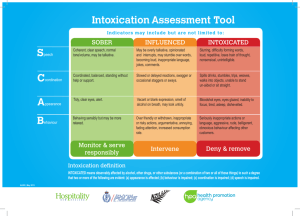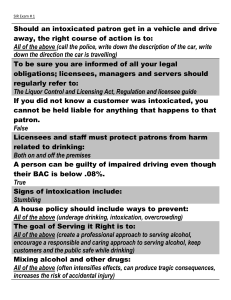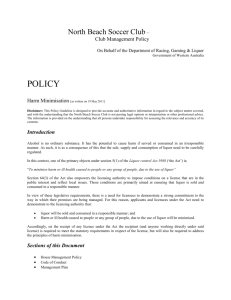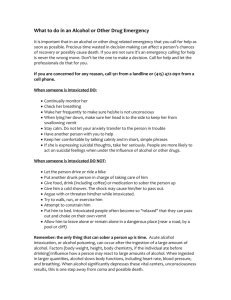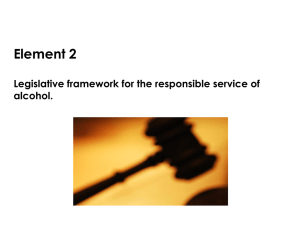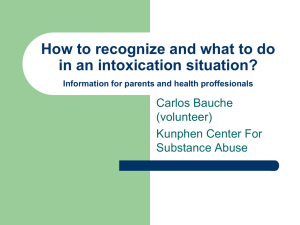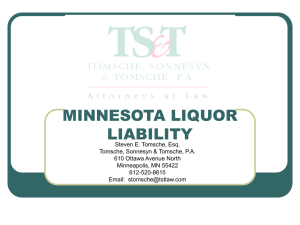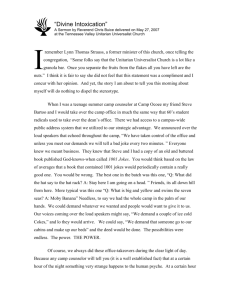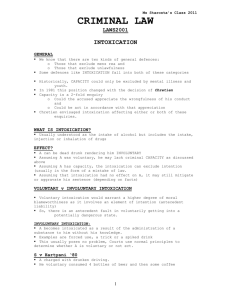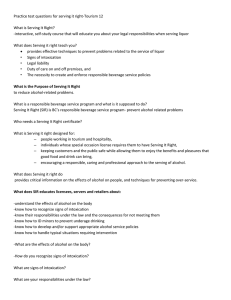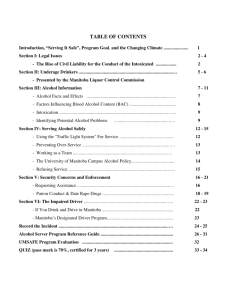Identifying the Signs of Intoxication
advertisement
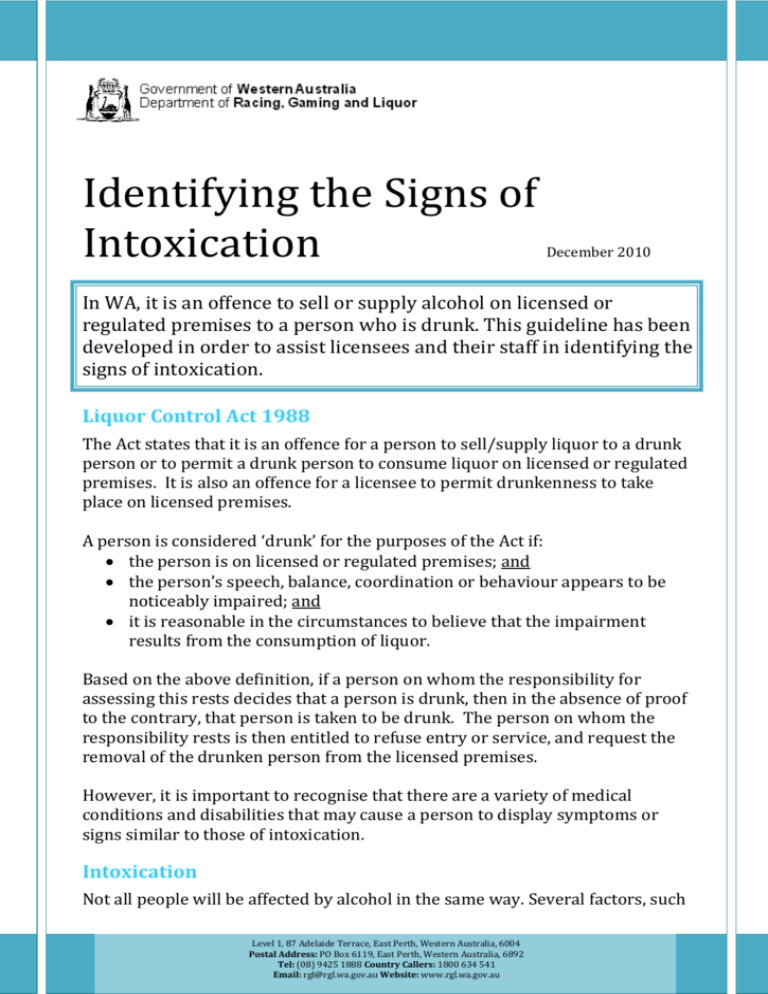
Identifying the Signs of Intoxication December 2010 In WA, it is an offence to sell or supply alcohol on licensed or regulated premises to a person who is drunk. This guideline has been developed in order to assist licensees and their staff in identifying the signs of intoxication. Liquor Control Act 1988 The Act states that it is an offence for a person to sell/supply liquor to a drunk person or to permit a drunk person to consume liquor on licensed or regulated premises. It is also an offence for a licensee to permit drunkenness to take place on licensed premises. A person is considered ‘drunk’ for the purposes of the Act if: the person is on licensed or regulated premises; and the person’s speech, balance, coordination or behaviour appears to be noticeably impaired; and it is reasonable in the circumstances to believe that the impairment results from the consumption of liquor. Based on the above definition, if a person on whom the responsibility for assessing this rests decides that a person is drunk, then in the absence of proof to the contrary, that person is taken to be drunk. The person on whom the responsibility rests is then entitled to refuse entry or service, and request the removal of the drunken person from the licensed premises. However, it is important to recognise that there are a variety of medical conditions and disabilities that may cause a person to display symptoms or signs similar to those of intoxication. Intoxication Not all people will be affected by alcohol in the same way. Several factors, such Level 1, 87 Adelaide Terrace, East Perth, Western Australia, 6004 Postal Address: PO Box 6119, East Perth, Western Australia, 6892 as the amount of alcohol consumed, general state of health, gender, weight, age, Tel: (08) 9425 1888 Country Callers: 1800 634 541 Email: rgl@rgl.wa.gov.au Website: www.rgl.wa.gov.au as the amount of alcohol consumed, general state of health, gender, weight, age, medications and food intake affect the rate at which a person becomes intoxicated. Alcohol is absorbed into the bloodstream as a person drinks. It is absorbed through the stomach and intestines and carried through the bloodstream to the brain. One of the first effects of alcohol is the loss of judgement and inhibitions. Signs of Intoxication There are many noticeable signs that a person may display as they become intoxicated. As blood alcohol levels rise, differences can be noticed in coordination, appearance, speech and behaviour. An intoxicated person may show the following signs: Behaviour Physical Signs Other Becoming loud, boisterous and disorderly. Spilling drinks. Rambling conversation. Becoming argumentative. Fumbling and difficulty in picking up change. Loss of train of thought. Swaying and staggering. Difficulty in paying attention. Annoying other patrons and staff. Becoming incoherent, slurring or making mistakes in speech. Becoming physically violent. Becoming bad tempered or aggressive. Using offensive language. Exhibiting inappropriate sexual behaviour. Difficulty walking straight. Bumping into furniture/other customers. Glassy/bloodshot eyes and lack of focus. Falling down. Not hearing or understanding what is being said. Drowsiness, dozing or sleeping while sitting at a bar table. Difficulty lighting cigarettes. Vomiting. Flushed Face. Disheveled clothing. ***These signs are not exhaustive and not necessarily conclusive of intoxication*** Other ways of determining if someone is intoxicated Interaction with the person and their friends will help to determine whether someone is intoxicated and their level of intoxication. Talk with the person and ask them questions such as: How much alcohol have they consumed? When did they last eat and how much? Whether they consider themselves intoxicated? Make further observations: Does the person smell of alcohol? When did the person enter the premises? What type of alcohol has been consumed? How much alcohol has the person been witnessed drinking? If it is difficult getting a reasonable response from the person, talk to the people they are drinking with and ask similar questions. If the person has a medical condition or disability, it is likely that their friends will be able to identify this. Be sensitive to a person’s right to privacy. The answers to the above will help to form a ‘reasonable’ belief as to whether the person is intoxicated. Reasonable grounds to a belief Remember, the law states that a person is drunk if it is ‘reasonable’ to believe that they are impaired due to the consumption of liquor. Reasonable grounds for belief that an impairment is due to alcohol consumption, is what a reasonable person would believe in the given situation, taking into account the relevant knowledge, facts and circumstances. A belief can be formed on the basis of observing the physical signs and symptoms, talking to the person and their friends and then considering whether such symptoms could be the result of alcohol consumption or another condition. Conditions that exhibit similar symptoms and signs to intoxication In WA, it is unlawful to refuse access to a public premises on the basis of that person’s physical or mental impairment. Certain types of disabilities can create the impression that a person is intoxicated. A disability is any continuing condition that restricts everyday activities. The Disability Services Act 1993 defines disability as meaning a disability: which is attributable to an intellectual, psychiatric, cognitive, neurological, sensory or physical impairment or a combination of those impairments; which is permanent or likely to be permanent; which may or may not be of a chronic or episodic nature; and which results in substantially reduced capacity of the person for communication, social interaction, learning or mobility and a need for continuing support services. Disabilities can result in a person having a substantially reduced capacity for communication, social interaction, learning or mobility. Prior to refusing service on the basis that a person is intoxicated, the possibility of medical conditions and disabilities that cause symptoms similar to intoxication should be ruled out. An example of such a disability is Acquired Brain Injury. This, among other things, affects the ability to walk, slurs and slows speech and affects motor responses, all of which can also be characteristics of intoxication. It is important that consideration be given to the possibility of the existence of any disability, prior to refusing service or entry to the premises on the basis that a person is intoxicated. How to help prevent intoxication It is the responsibility of licensees and their staff to prevent patrons from becoming intoxicated. There are things that can be done to slow the intoxication process down, including: Actively promote low and non-alcoholic drinks and food accompaniments. Wait for the person to reorder, don’t automatically fill up drinks. Slow service down - keep busy attending to other patrons or cleaning. Point to the relevant sign outlining legal responsibilities. Alert other staff to a patron showing signs of intoxication. Serve water with drinks and ensure water is constantly available for patrons. Talk to the patrons to gauge the level of intoxication. This publication avoids the use of legal language. Information about the law may have been summarised or expressed in general statements. This information should not be relied upon as a substitute for professional legal advice or reference to the actual legislation. What to do if someone is intoxicated It is against the law to serve alcohol to a person who is intoxicated. If there are reasonable grounds for the belief that someone is intoxicated, service must be refused. How to refuse service: Use tact – politely inform the person they will not be served any more alcohol. Don’t speak to the person in front of others. Repeat firmly that by law they cannot be served another drink. Management policy may be to offer a nonalcoholic drink or suggest ordering food. Notify the manager and security. Also notify other bar staff that service to the person has been refused. Be sure of the reasons for refusal of service and that these reasons are not discriminatory (eg based on race, sex, impairment etc). Penalties Licensees and managers may be fined up to $10,000 whilst employees and agents may be fined up to $4000 for selling/supplying liquor to a drunk person or allowing a drunk person to consume liquor on licensed or regulated premises.
